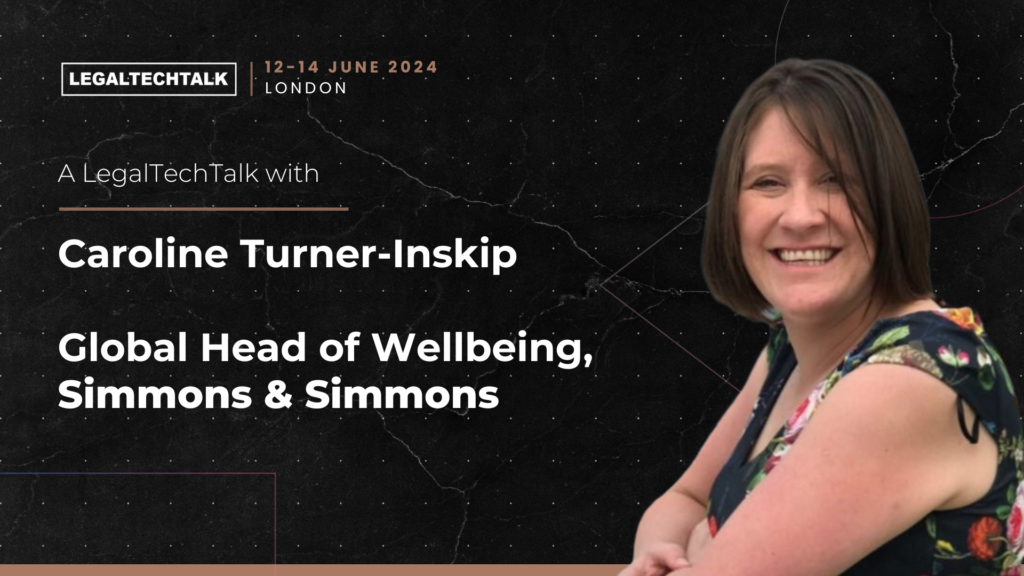Source: Modern Law Magazine
With Caroline Turner-Inskip, Global Head of Wellbeing at Simmons & Simmons
Interviewed by Bradley Collins, CEO, LegalTechTalk
Summary: To attract and retain top talent, law firms should go beyond competitive compensation. While financial rewards are essential, other factors like skills development, innovative working practices, psychological safety, empowerment, flexibility, autonomy, and a purpose-driven business strategy are equally important. Top talent seeks opportunities to thrive, develop, and align with their values.
Bradley: Hi Caroline, what are some of the things law firms are doing to attract and retain top talent?
Caroline: There are of course various strategies to attract and retain talent. This is a highly competitive market to get into and once you are in, it’s a competitive landscape. It would be wrong of me to not mention competitive compensation at the top but you know, whilst more money (let’s be honest that is what we mean when we say competitive compensation) can equate to more happiness and so perhaps attract talent, there was a study published in 2010* that concluded that after about $75,000 a year, your happiness levels off, even if your income increases. So the offering to the incredible talent in our industry must be so much more.
Top talent wants to thrive, wants to develop, and wants to work somewhere that is aligned with their own values. Empowerment, flexibility, autonomy, and being a high performer – tell me a single person who in this industry doesn’t want that! Firms therefore need to offer skills development, innovative working practices, psychologically safe workplaces, and a purpose-driven business strategy.
I also fundamentally believe that people want to see themselves in others, the need role models and genuine diversity. Real action and commitment to diversity, inclusion, and equity are so important and our young talent in particular has a highly attuned radar when the words don’t meet the actions in the space.
Bradley: What kind of culture do you believe is required at law firms to enable maximum productivity across the board – and how has this evolved post-pandemic?
Caroline: As Simmons & Simmons’ Global Head of Wellbeing it perhaps comes as no surprise that I believe a wellbeing culture is essential. Within the legal profession, at all levels from lawyers to business services, there are high standards for excellence, and with that comes pressure.
Most of us are likely to say that we work well under pressure and that we need some form of stress to perform at our best. But, when that pressure develops, it can begin to affect our performance and well-being. Critically for me, wellbeing is about ensuring that we have the culture and the necessary structures in place to support the work our people do.
Because when supported they’re developing and thriving within their careers – which is why the key word and ambition underpinning Simmons’ entire strategy is ‘thrive’. There is a very clear relationship between a thriving lawyer and a high-performing lawyer and therefore, wellbeing is key for productivity. And has this evolved post-pandemic, undoubtedly.
During the pandemic, we were told to look after ourselves and protect ourselves. And it also created a shift in people’s expectations about what they do and how they manage their lives – it pushed our industry on and we are having conversations now that, at a guess, we would not have been having for another 10 or 15 years.
Bradley: What else can law firms do to create a more inclusive and welcoming workplace for young professionals?
Caroline: So I would say listen and when I say listen, I mean empathetic listening. The trainees and apprentices starting today, will be the partners who will be leading the firm when I retire – they are our succession plan, and building the next generation law firm means we must listen to that generation.
Key Takeaways:
1: Beyond Competitive Compensation
To attract and retain top talent, law firms should offer more than just competitive compensation. Emphasise skills development, innovative working practices, psychological safety, empowerment, flexibility, autonomy, and a purpose-driven business strategy. Recognise that happiness levels off after a certain income threshold, and focus on creating a compelling workplace environment.
2: Foster a Wellbeing Culture
Prioritise a well-being culture to enhance productivity. Establish support structures to help employees thrive and perform at their best. Wellbeing initiatives are essential for high performance and should be integrated into the firm’s culture.
3: Empathetic Listening for Inclusivity
To create a more inclusive workplace for young professionals, engage in empathetic listening. Pay attention to the needs and perspectives of the next generation. Commit to real action and diversity, inclusion, and equity initiatives. Empower the future leaders of the firm by valuing their input and experiences.
Caroline Turner-Inskip
Partner, Real Estate – Global Head of Wellbeing
Simmons & Simmons LLP








